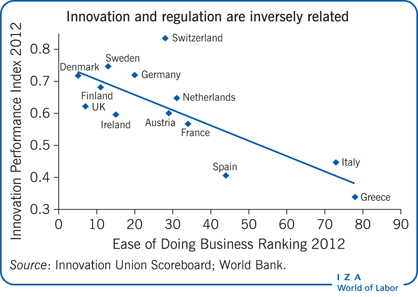Elevator pitch
Entrepreneurs, creators of new firms, are a rare species. Even in innovation-driven economies, only 1–2% of the work force starts a business in any given year. Yet entrepreneurs, particularly innovative entrepreneurs, are vital to the competitiveness of the economy and may establish new jobs. The gains of entrepreneurship are only realized, however, if the business environment is receptive to innovation. In addition, policymakers need to prepare for the potential job losses that can occur in the medium term through “creative destruction” as entrepreneurs strive for increased productivity.

Key findings
Pros
Entrepreneurs boost economic growth by introducing innovative technologies, products, and services.
Increased competition from entrepreneurs challenges existing firms to become more competitive.
Entrepreneurs provide new job opportunities in the short and long term.
Entrepreneurial activity raises the productivity of firms and economies.
Entrepreneurs accelerate structural change by replacing established, sclerotic firms.
Cons
Only few people have the drive to become entrepreneurs.
Entrepreneurs face a substantial risk of failure, and the costs are sometimes borne by taxpayers.
In the medium term, entrepreneurial activities may lead to layoffs if existing firms close.
A high level of self-employment is not necessarily a good indicator of entrepreneurial activity.
Entrepreneurship cannot flourish in an over- regulated economy.